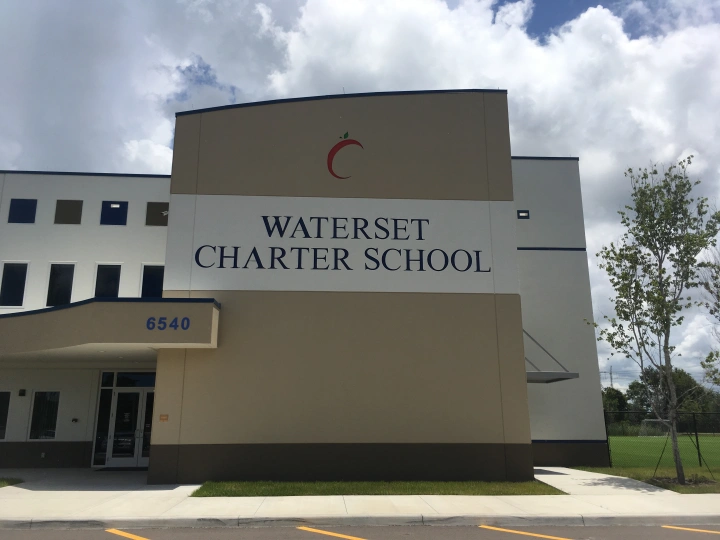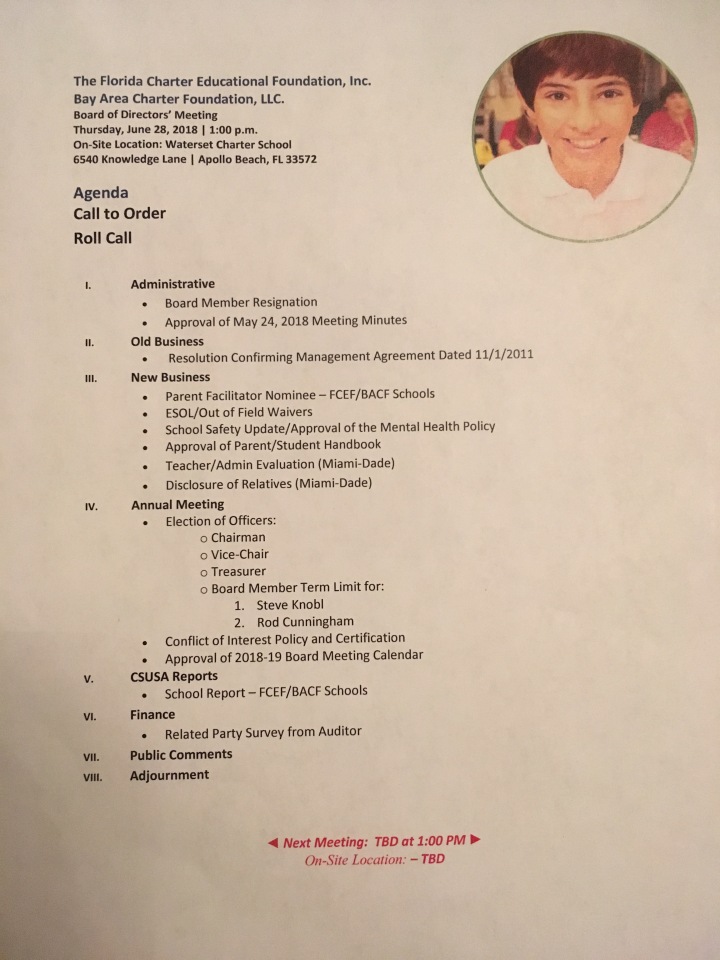
Two weeks ago today, on June 28th, I attended my first Charter Schools USA board meeting at Waterset, the newest CSUSA school that was built in the Waterset development on the south side of Big Bend Road in Hillsborough County. Nestled among a sprawling development that includes a clubhouse and homes for the upper-middle class residents of the area, Waterset is a handsome facility with state of the art technology and classrooms that are surely meant to lure in unsuspecting parents who only want the best for their children.
Before getting to the meeting itself, let me unequivocally state that I am not opposed to charter schools or school choice on principle. As an International Baccalaureate teacher at an A rated magnet school here in Hillsborough County, it would be dishonest of me to take a stand against school choice when I work at a choice school. And if the Florida Legislature adequately funded public education here in this state so that all choices could receive equal funding, I would probably have little to rail against.
But this is Florida, after all, and our elected officials clearly have a pet project of underfunding traditional public schools while shoveling money at charters and vouchers. So rail against this inequity I must.
When Al Shanker first proposed the idea of charter schools in 1988, they were meant to be a place that allowed teachers to take control and offer innovative approaches to students who struggled with traditional education. He wanted professionals who knew best to be unencumbered by bureaucratic red tape, allowed to propose and administer their own programs, and flourish alongside students who needed their help. It’s a noble idea, yet one that has been co-opted and corrupted by corporate interests.
For those who are unaware of the charter taxpayer scam being perpetuated by several privately held companies—the two largest of which are Academica and Charter Schools USA—the following is a brief primer (although you can listen to this excellent podcast with Pat Hall to gain a deeper understanding):
In 1996, Florida approved charter schools as an alternative to traditional public schools. By law, these schools are considered non-profit just like their traditional counterparts and are funded with taxpayer dollars. Many of the early charter schools were small operations set up by parents or other community members who wanted to serve niche student populations who struggled in traditional settings, just as Shanker had first proposed (Pepin Academies and F.A.C.E. are good examples of charters that are genuinely non-profit here in HCPS).
Somewhere along the way, however, this model has been perverted due to a loophole in the legislation, which has allowed for-profit charter management companies to create an industry that is bilking Florida taxpayers to the tune of tens (if not hundreds at this point) of millions of dollars per year. In essence, this scam works with three key players: real estate, construction, and the for-profit charter management companies such as Academica, Charter Schools USA, Charter School Associates, etc. These companies have numerous subsidiaries that allow them to rig the game at the expense of us all. One LLC will purchase the land for cheap, another LLC will build the school, and, after the for-profit company has installed a technically “non-profit” board, this board effectively turns around and pays the for-profit management company for back office services, “management fees”, and exorbitant rental-lease agreements that are typically astronomical compared to what other buildings in the area receive on a per-square-foot basis. In the end, on average, these companies end up siphoning off nearly HALF of the public dollars meant for students and classrooms.

Worst of all, Tallahassee’s incestuous relationship with these for-profit charter management companies are a direct result of the legislation we have seen in the last two years under House Speaker Corcoran. Manny Diaz, for example, one of the principal architects behind HB7069 that ensured more money was devoted to charters, draws a six figure salary for Doral College, a for-profit institution affiliated with Academica, the largest of these profiteers in the Sunshine State. Hello conflict of interest! Florida ethics laws are clearly a joke to these elected officials.
***Back to the CSUSA Board Meeting***
When I walked into the meeting, I was greeted by Kerianne, a woman who works for CSUSA and travels the state to act as a board liaison on behalf of the company. Although technically a public meeting, it was held in a fairly small room that included a long table with chairs around it and only three empty chairs for onlookers. Clearly these meetings are not well attended, which I am sure they would prefer.
The meeting itself was fairly quick, and the people I met were all quite friendly. I have no doubt that the administrators and parent-facilitators at the table (as well as the teachers and staff who work at these schools) genuinely want the best for the students they serve. Ultimately I believe anyone who works directly with children on a daily basis are simply giving back to the next generation and their local communities. But there were a few highlights that are noteworthy:
- The CSUSA board liaison, Kerianne, effectively ran the meeting. The board members are simply there to go through the motions and rubber stamp everything.
- One of the items approved regarding SB7026 was described as “lots of boilerplate insert school here”, which contained information for how CSUSA would handle school safety initiatives. Some districts are allowing them to “piggy back” on their SRO or SSO initiatives, but other counties are resisting and telling the charters to pay for officers themselves (HCPS has told them that they are responsible for the cost). CSUSA plans to use their employees as guardians or contract with private security firms if the need arises.
- Most notably, the SB7026 legislation also includes provisions for addressing mental health, but if CSUSA doesn’t receive enough funding from the state or districts for school psychologists or social workers, the schools are to kick the problem back to the parents for them to handle privately.
- Rod Jurado, the board chair, noted that CSUSA has been speaking with Senator Bill Galvano (the Senate President in waiting) about “seeing what we can do to get into Manatee County.”
- Board members apparently have term limits, yet were given extensions by a vote.
- Noted that CSUSA will be opening (or recently opened) 9 new schools, serving 8500 students (sidenote: at $7408 per-student this means CSUSA will receive $63 million in new revenue, with approximately $28.3 million being added to their bottom lines—all at taxpayer and traditional public education expense).
- A mention of growing concern about securing bonds for the new schools being built before the interest rates went up.
- Review of school grades for the local CSUSA schools under the board’s purview; interestingly enough, they only discussed the three schools that received an A. Waterset barely earned a C with 337 points.
And, perhaps in an unintentionally ironic yet comical statement, Mr. Jurado explicitly made mention that the schools and board are non-profit, carrying on about how he nor any other board member receive a salary or stipend, and that they should all help correct this misconception when speaking to the public. I still wonder if he would have even said it had I not been in the room.
In the end, the board meeting is largely a ruse that is intended to look like an actual board meeting. Not once was there any discussion of any agenda items, and what discussion that did transpire was mostly explanations that were given to the board from the CSUSA liaison, Kerianne. Although other meetings typically revolve around “recruitment and retainment” of students to maximize profit, most of the money talk was confined to securing bonds for their new buildings, which are owned by the companies themselves and not the public that funded them. The entire enterprise is a racket, and all taxpayers in Florida should be aware and demand better from our elected officials. The Florida Legislature should legislatively close the loophole that allows these charlatans to legally steal from public education coffers that are filled with our tax dollars.


Public beware- “…the problem is to be kicked back to let the parents for them to handle privately.” There are many such hard earned liberties that public school families take for granted. We should have daily articles educating parents!
LikeLiked by 1 person
Charter schools have been researched and found to better serve ESOL, ESE, lie performing students. There is a place for charter schools. The problem public education teachers have with charter schools is that they are serving students for less than the public schools. Of course those in charge of the State’s education budget prefer the model that costs less.
LikeLike
Tony, no one is arguing against charters, especially me. But I am DEAD SET against the profiteering at the expense of our children and their future. Feel free to peruse the “ISSUES” page to get the rest of my common sense, centrist take on many of the challenges we face here in Florida.
LikeLike